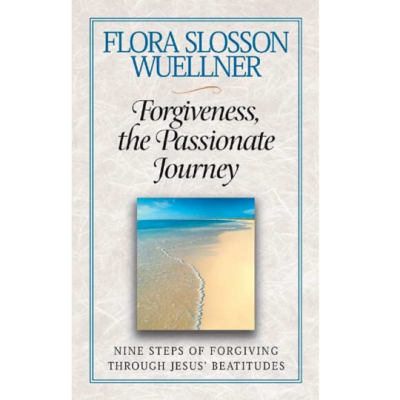Thank you for visiting. We trust that you have enjoyed reading our articles.

Book Review: Forgiveness, the Passionate Journey Nine Steps of Forgiving through Jesus’ Beatitudes by Flora Slosson Wuellner
“I have told you this so that my joy may be in you and that your joy may be complete” (John 15:11 NIV).
I think most Christians understand that that through the blood of Jesus we have forgiveness for our sins and life everlasting with the Father. However, many of us still struggle with the concept of forgiveness. This book uses the Beatitudes, eight blessings recounted by Jesus in the Sermon on the Mount in the Gospel of Matthew, to point the reader toward Jesus as they travel the path of forgiveness.
This book is helpful for those seeking spiritual growth and insight for healthy, empowered forgiveness of others and forgiveness of ourselves. Each chapter focuses on a Beatitude and concludes with a healing meditation. The meditations help the reader to process their emotions by acknowledging that “hurt, hostility, and healing that is hot and Holy ground.”
I underlined a section in the Introduction that speaks to the Biblical definition of “blessed.” “To be blessed means two things in Scripture: It means to be happy, to be fulfilled. It also means to be empowered by God’s love to undertake a task. The living Jesus Christ not only empowers us for healthy forgiveness but walks the path with us, enfolding us with God’s compassion, praying through the pain “that my joy may be in you, and that your joy may be complete” (John 15:11)
The book explains that the central focus of the Beatitudes is “what is happening in our heart’s core.” In His sermon, Jesus is addressing release from that which imprisons and corrupts our heart. This is important because our words and actions are a manifestation of our heart. Forgiveness is a release from the prison and burden of the past. Forgiveness is not a release from responsibility. As we study and pray and grow closer to Christ we are able to do the things that we cannot do on our own. Through Him we can forgive others and ourselves.
Those that hurt us are often wounded people themselves. We will encounter some people in life that knowingly choose to do evil things to other people. The author states that they are “caught in a prison of self-destruction that almost defies description.” I had not realized that often when people deliberately hurt us they are acting out of a deep inner hurt in themselves. Instead of giving emotional control to our attacker by feeling angry, we are asked to consider feeling pity and wonder what has happened to this person that has caused them to act in such an evil manner? This is not done to minimize the hurt, but to facilitate our healing.
The discussion on self-forgiveness will also be helpful for many. As we learn to listen to our inner selves we also learn to be released from rigid self judgement. The door is opened for healing and transformation that can only be accomplished by God.
The author does not advocate using this book in lieu of professional therapy. The author clearly states in the Introduction that she believes in “prayer plus therapy, especially if the wound, abuse, anger, or fear is deep and longstanding.” The book is available from the Upper Room Bookstore.
Prayer: Thank you for the Sermon on the Mount. Help us to find forgiveness and peace in the Beatitudes of Jesus. Amen.
Meet the Author
Todd Shupe is a Men’s Ministry Specialist through the General Commission of United Methodist Men and is in training to be a Certified Lay Minister through the Louisiana Conference of the United Methodist Church. He currently serves as the President of the Baton Rouge District of United Methodist Men and is a Board Member for Gulf South Men and serves on the Action Team for The Kingdom Group. He is a volunteer for the Walk to Emmaus, Grace Camp, and Iron Sharpens Iron. Todd resides in Baton Rouge, Louisiana.
We welcome your comments below.
Liked this post?
Read more below or search for more topics...
-
Judge Others or Pray?
Judge Others or Pray? "No one, sir," she said. "Then neither do I condemn you," Jesus declared. "Go now and leave your life of sin” (John 8:11).It is so very tempting to judge others as we can go about our day. We often do not say anything negative but in our minds, we condemn others. Some of us will pass judgment when we see someone smoking cigarettes. Others will pass judgment when they see a person with multiple tattoos and piercings. We can even quote Scripture to support our case. Don’t they know that their bodies are a “holy temple”? (1... -
Grapes, Giants, and God
Grapes, Giants, and God “They gave Moses this account: ‘We went into the land to which you sent us, and it does flow with milk and honey! Here is its fruit. But the people who live there are powerful, and the cities are fortified and very large. We even saw descendants of Anak there. The Amalekites live in the Negev; the Hittites, Jebusites and Amorites live in the hill country; and the Canaanites live near the sea and along the Jordan.’ Then Caleb silenced the people before Moses and said, ‘We should go up and take possession of the land, for we can certainly do it’” (Numbers 13:27-30 NIV). I recently heard... -
Opportunities Abound For Those Seeking Volunteer Roles With Christian Organizations
Opportunities Abound For Those Seeking Volunteer Roles With Christian Organizations "The greatest among you will be your servant" (Matthew 23:11 NIV) Volunteer work should be seen as a hallmark of every good Christian’s character. Those who want to live a life in God’s good graces should feel compelled to help out their brothers and sisters around them. The next question then is how to get involved with a volunteer effort, as it’s often one of the only ways to accomplish the goodwill work that needs to be addressed in this world. Fortunately, there is no shortage of organizations that need volunteers. I would...



